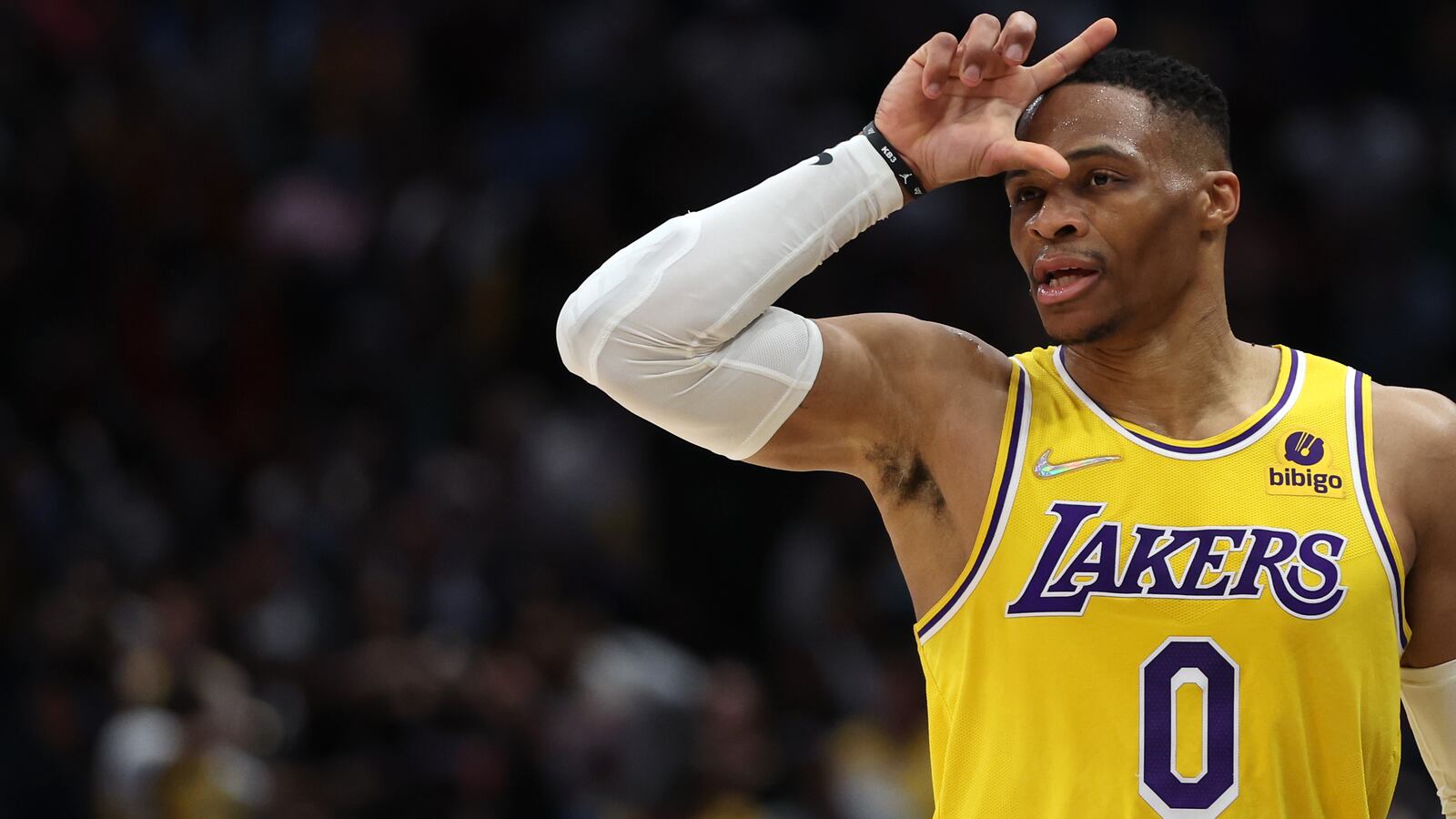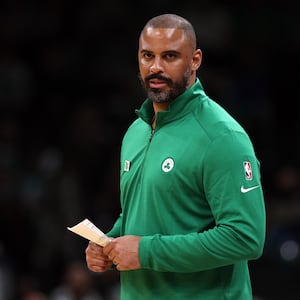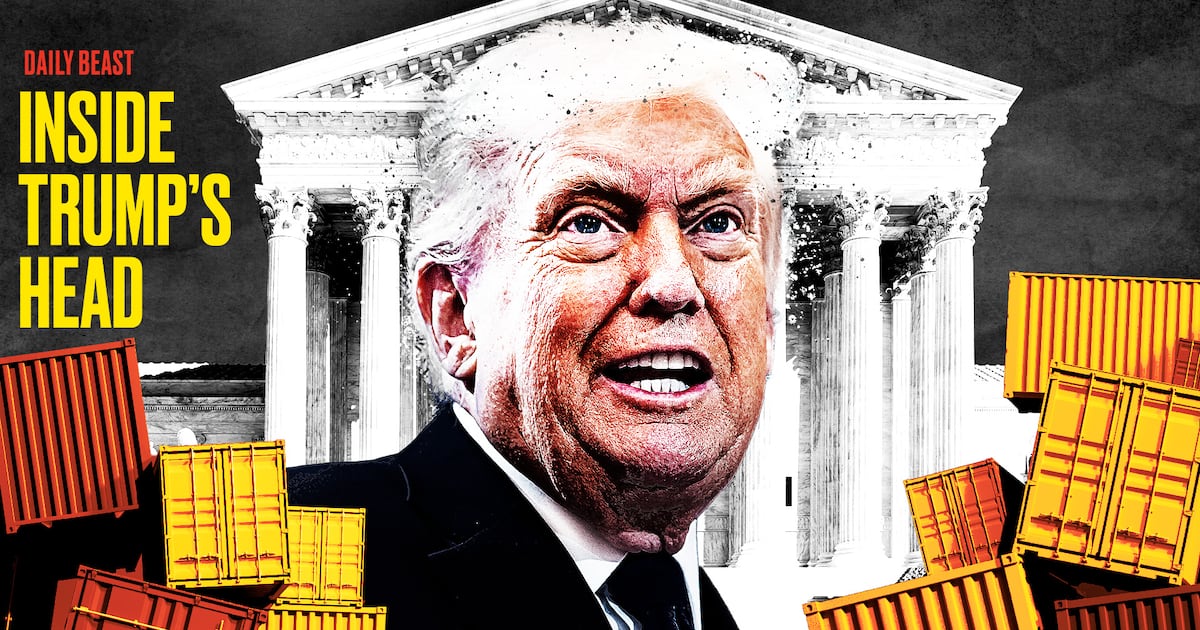The Los Angeles Lakers are ass for a number of reasons.
LeBron James, at a whopping 38 years old, doesn’t have the juice for night-to-night domination he once had. And even if he did, the roster they have built around him is absolute nonsense. All of LeBron’s best teams flanked him with shooters, giving him space to operate in the lane and exploiting his preternatural passing ability, but the Lakers have loaded the squad with a bunch of slashers, ball handlers, and guys who are simply not very good. Four games in, they’ve shot 21.2 percent from the three-point line. All-world forward Anthony Davis has been pedestrian. Patrick Beverley, whose claim to NBA fame is turning in a theatrical defensive performance night after night, is sitting at fourth in minutes played on the team. It’s a nasty scene.
But no one has been screaming into the void like Russell Westbrook. Westbrook has been terrible. When the Lakers traded a handful of younger contributing players for him last summer after their empty title defense, it was a desperate attempt to raise the ceiling on a squad that didn’t have a clear path to growing out of their rut. Kyle Kuzma is swell, the thinking went, but a Hall of Fame Big 3 he does not make. Unfortunately, they picked a complicated Hall of Famer, and paired him with a roster that didn’t mesh with his skillset in the slightest. The result was a disappointing, injury prone, playoff-missing squad, where Westbrook looked old and out of place.
After that fiasco, he spent the summer tossed around in the sort of lopsided trade rumors that only Laker fans could dream up. But with the season starting, Russ didn’t care. He was ready to ball. Just kidding.
Westbrook is averaging 10.3 points on 28.9 percent shooting. He went 0/11 against the Clippers, still can’t make three-pointers, and has taken no steps toward adjusting his game or his shot selection to match his diminished abilities at all. Even if he was producing at his normal rate, he would still uncomfortably overlap with LeBron, who is best complemented by shooters and not ball-handling midrange brickers. (LeBron, who lobbied for Westbrook to be on the team, doesn’t seem to grasp this fact about his own career.) Westbrook is having the kind of season where, when you confront a guy yelling you suck! at you while you walk into the tunnel and tell him to do it again to your face, he does. The mystique, the fear, the respect for the triple-double king, it’s just gone. Only Westbrick remains.
There was a path to Westbrook maintaining his dignity. We saw it on the Washington Wizards, after a disappointing stop in Houston. There, playing for a team with no great ambitions, he got to dominate possessions like he wanted to, ballast an OK squad, make the back end of the playoff hunt, exit early, cook up some highlights, and earn low-level goodwill with a fanbase who doesn’t froth at the mouth and call for your head in a basket every offseason.

LeBron James talks with Russell Westbrook of the Los Angeles Lakers during a preseason game against the Sacramento Kings on October 14, 2021, at Golden 1 Center in Sacramento, California.
Rocky Widner/GettyBut LeBron’s never-ending quest for more upside, even at the expense of common basketball sense, has put Russell in a spotlight he can’t live up to. Instead of playing out his Hall of Fame career and leaving everyone wondering if there was a spot where he could have succeeded if he’d only made his way there, Westbrook has been yanked into the mire of his own limitations—a deeply frustrating player who brought force everywhere he went, but not always push.
Westbrook’s entire career has been something like this. Selected fourth by the Oklahoma City Thunder in 2008, Westbrook was obscenely athletic and physically crafted by the gods to play basketball. He was tall for a guard that explosive, sported incredibly long arms, and was seemingly impervious to injury for the first decade or so of his career. He and Kevin Durant led the Thunder to the NBA Finals when Westbrook was 24, only to be felled by LeBron and the Miami Heat, the superteam that was supposed to end all superteams.
Even as that squad was dominating thanks in large part to Durant, hands-down one of the best players of his generation, Westbrook wasn’t all that interested in deferring to his superior teammate. His explosiveness at the rim was diminished by his poor three-point shooting and propensity for taking—and back-ironing—long two-pointers, which were going out of fashion as efficiency-based analytics hit the mainstream. The next time they made the Conference Finals, they faced off with the San Antonio Spurs—older, headier, efficient and organized in ways few teams had managed before. Westbrook’s insistence on playing with force the whole game, every game, breaking plays at random and relying on his physical dominance, looked juvenile and sloppy by comparison. People wondered aloud if Durant was better off without him.
Doubts intensified as the Thunder ran headfirst into Steph Curry and the Golden State Warriors. Curry was Westbrook’s polar opposite: not physically imposing but historically efficient, the best three-point shooter in history, and productive whether the ball was in or out of his hands. He simply did not make mistakes, while some games that was all Westbrook could do.
After the Thunder blew a 3-1 lead against the Warriors in the 2016 Conference Finals, Durant, in a move lacking in subtlety, joined the Warriors in the offseason, endorsing the sentiment that someone chasing a title would rather play with Steph than Russ. Westbrook responded to this act of betrayal by prowling around the court like a maniac, exploding night after night, hounding his opponents (and occasionally his own teammates) for rebounds, and averaging a triple-double—the first time anyone had accomplished the feat since Oscar Robertson in the 1961-62 season.
His team won 47 games and lost to the Rockets in the first round. Subsequent Westbrook-Thunder squads didn’t accomplish much either, even after he was paired with Paul George, an excellent do-everything forward. That era came to a screeching halt when Damian Lillard did this:
From here, ignominy. A poor showing on the Rockets, who traded Chris Paul for the privilege. Paul, on the other hand, led a team full of has-beens to the playoffs through sheer force of will. Westbrook followed that up with his cozy Wizards tenure, vibing his way to a decent season away from the cameras.
Everywhere he went, everyone he played with, it was the same: a spectacular talent who just couldn’t bring himself to not force it, to trust his teammates, to take himself out of the center of the machine and let the game come to him. The thing that made him a singular force on the court, his personal belief in his own indomitability, could not be extricated from the things that made him frustrating (his blindness to the bigger picture).
Westbrook’s failures illustrate a fundamental truth of human life: force itself is simply not good enough. We do not succeed as a collective when we press the issue at the expense of ultimate victory. Russ is a cowboy, and it’s a bummer to watch his well of pure individualistic energy collapse like a cresting wave. But it’s the way of things. You need more than an overwhelming sense of self to succeed.







